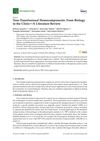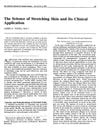 5 citations,
October 2014 in “Journal of cosmetic and laser therapy”
5 citations,
October 2014 in “Journal of cosmetic and laser therapy” Combining physical dermabrasion with chemical peeling is more effective for skin treatment than chemical peeling alone.
 3 citations,
January 2016 in “Elsevier eBooks”
3 citations,
January 2016 in “Elsevier eBooks” Steroid hormones are crucial for body functions and have various medical uses, but their misuse can lead to dependence.
 88 citations,
December 2018 in “Advanced Healthcare Materials”
88 citations,
December 2018 in “Advanced Healthcare Materials” Layer-by-Layer self-assembly is promising for biomedical uses like tissue engineering and cell therapy, but challenges remain in material safety and process optimization.
 68 citations,
July 2011 in “Journal of Biochemistry/The journal of biochemistry”
68 citations,
July 2011 in “Journal of Biochemistry/The journal of biochemistry” New LPA receptors (LPA4, LPA5, LPA6) have diverse roles in the body.
 55 citations,
September 2017 in “Expert Opinion on Drug Discovery”
55 citations,
September 2017 in “Expert Opinion on Drug Discovery” Different factors affect where drugs are absorbed in the small intestine, which is important for effective medication use.
 47 citations,
May 2020 in “Cardiovascular Research”
47 citations,
May 2020 in “Cardiovascular Research” The document concludes that future heart disease research should account for sex-specific differences to improve diagnosis, treatment, and outcomes.
 40 citations,
May 2016 in “Proceedings of the National Academy of Sciences of the United States of America”
40 citations,
May 2016 in “Proceedings of the National Academy of Sciences of the United States of America” Changes in keratin make hair follicles stiffer.
 38 citations,
January 2014 in “International Journal of Endocrinology”
38 citations,
January 2014 in “International Journal of Endocrinology” Adrenal disorders can cause lasting brain and behavior issues in children.
 36 citations,
August 2011 in “Experimental Dermatology”
36 citations,
August 2011 in “Experimental Dermatology” Eccrine sweat gland's clear cells likely cause excessive sweating in hyperhidrosis.
 29 citations,
December 1998 in “Seminars in Cutaneous Medicine and Surgery”
29 citations,
December 1998 in “Seminars in Cutaneous Medicine and Surgery” New treatments for hair loss show promise, especially finasteride for men and a stronger minoxidil formula.
 23 citations,
March 2010 in “Medical hypotheses”
23 citations,
March 2010 in “Medical hypotheses” Merkel cells may have roles in sensing magnetic fields, creating fingerprints, Reiki energy healing, passing on environmental information to offspring, and influencing hair shape.
 23 citations,
August 2005 in “Expert opinion on pharmacotherapy”
23 citations,
August 2005 in “Expert opinion on pharmacotherapy” New treatments for low male hormones improved sexual function and mood but had unclear risks, especially for older men.
 14 citations,
October 2016 in “Psychoneuroendocrinology”
14 citations,
October 2016 in “Psychoneuroendocrinology” Finasteride affects brain processes related to neurotransmission and metabolism, potentially helping with neuropsychiatric conditions.
 12 citations,
March 2018 in “Bioengineering”
12 citations,
March 2018 in “Bioengineering” The document concludes that products like PRP and PRF show promise for tissue healing, but evidence of their effectiveness is inconsistent.
 9 citations,
March 2021 in “Hormones”
9 citations,
March 2021 in “Hormones” COVID-19 may affect male fertility and women might have better outcomes due to hormonal and immune differences.
 8 citations,
May 2017 in “Current traditional medicine”
8 citations,
May 2017 in “Current traditional medicine” Stinging nettle has compounds that help with joint pain, arthritis, and prostate issues.
 6 citations,
July 2023 in “Nature cell biology”
6 citations,
July 2023 in “Nature cell biology” SOX9 helps determine stem cell roles by interacting with DNA and proteins that control gene activity.
 6 citations,
October 2017
6 citations,
October 2017 Indian Gooseberry has potential for cancer prevention and treatment and promotes hair growth.
 6 citations,
January 2016 in “Springer eBooks”
6 citations,
January 2016 in “Springer eBooks” Invasomes effectively deliver drugs through the skin and have potential for improved treatments.
 3 citations,
March 2017 in “Regulatory toxicology and pharmacology”
3 citations,
March 2017 in “Regulatory toxicology and pharmacology” Aleglitazar and its major metabolite are safe enough to proceed to Phase 3 clinical trials.
 2 citations,
September 2023 in “Scientific reports”
2 citations,
September 2023 in “Scientific reports” The nanocomposite films with vitamins and nanoparticles are promising for fast and effective burn wound healing.
 1 citations,
January 2009 in “Elsevier eBooks”
1 citations,
January 2009 in “Elsevier eBooks” Anorexia Nervosa and Bulimia Nervosa are complex eating disorders with increasing incidence among young females, significant morbidity, and varying mortality rates, requiring more research for better treatment.
 September 2020 in “Nature, Environment and Pollution Technology/Nature, environment and pollution technology”
September 2020 in “Nature, Environment and Pollution Technology/Nature, environment and pollution technology” Eating plants from polluted areas can cause liver and kidney damage in rats due to toxic metals.

PlacMA hydrogels from human placenta are versatile and useful for cell culture and tissue engineering.
 June 1997 in “The American Journal of Cosmetic Surgery”
June 1997 in “The American Journal of Cosmetic Surgery” Understanding the science of skin stretching is crucial for safe and effective hair replacement techniques.
 14 citations,
May 2021 in “Marine Drugs”
14 citations,
May 2021 in “Marine Drugs” PDRN, derived from salmon sperm, shows promise in healing wounds, reducing inflammation, and regenerating tissues, but more research is needed to understand its mechanisms and improve its use.
 13 citations,
October 2012 in “InTech eBooks”
13 citations,
October 2012 in “InTech eBooks” Nanocarriers could improve how drugs are delivered through the skin but require more research to overcome challenges and ensure safety.
 10 citations,
July 2011 in “Wound Repair and Regeneration”
10 citations,
July 2011 in “Wound Repair and Regeneration” New antiscarring strategies show promise, including drugs, stem cells, and improved surgical techniques.
 4 citations,
June 2013 in “The Journal of Rheumatology”
4 citations,
June 2013 in “The Journal of Rheumatology” The document concludes that various findings in rheumatology offer insights into disease severity, treatment responses, and potential risks in medication, with some limitations due to unspecified participant numbers.
 January 2024 in “International journal of pharmaceutical sciences review and research”
January 2024 in “International journal of pharmaceutical sciences review and research” Indian jujube has many medicinal properties and can help treat ailments like diabetes, inflammation, and cancer.






























